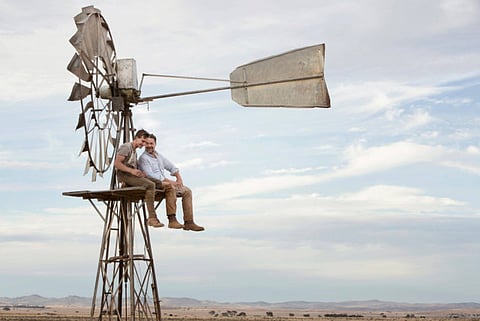Review: ‘The Water Diviner’, a handsome crowdpleaser
First-time director Russell Crowe plays a grieving father with an unusual ability to detect water in a good-looking melodrama with a big heart

Earlier this year, in Darren Aronofsky’s biblical epic Noah, Russell Crowe saved humanity from soggy ruins after God used floods in a spiritual cleansing to wash away heathens.
On Boxing Day the actor returns to dip his toes in another big-budget movie with water at its symbolic core, this time getting both behind and in front of the camera. Crowe stars as Joshua Connor in his directorial debut, The Water Diviner, a postcard war melodrama illuminated by beautiful colours and sunshine-through-leaves lighting.
In the film, which is nothing if not polished, water symbolises a spiritual connection the protagonist shares with three sons lost in the great war (missing in action and presumed dead) and a grief-stricken wife. Determined to bring his boys’ bodies home, Joshua travels to Constantinople and stays at a hotel managed by a beautiful and mysterious woman named Ayshe (Olga Kurylenko) as he tries to find a way to Gallipoli.
The father-on-a-mission storyline latches on to multiple kinds of symbolism — from Joshua’s search as a means of finding emotional closure to water as a spiritual bloodline — and oscillates between picturesque romantic drama and intrepid globetrotting, the kind of exotic location switching that wouldn’t feel out of place in a Herge comic.
When Joshua encounters the people responsible for crimes against his sons, the film reveals its hand as a moral fable about the redemptive powers of forgiveness. Like Jonathan Teplitzky’s The Railway Man (released on Boxing Day last year) in which a war-scarred Colin Firth became friends with his Second World War torturer, Crowe circumvents the proposition that either side can win the war by recasting the battle as something that suppressed rather than ennobled the human spirit.
Oscar-winner Andrew Lesnie’s cinematography is exquisitely clean, as if the entire movie is one big touched-up photo. The Water Diviner’s effervescent look is offset by grainy flashback footage capturing the sick and the stench of the battlefield. This change in colours and composites is a textbook mood switch from photogenic to dark and despairing but it’s undoubtedly effective: moments of washed-out grisly squalor to counter the pretty pictures.
Early in the film we learn of Joshua’s unusual ability to know where water is, a sort of Horse Whisperer for H2O. That this sixth sense doesn’t feel dramatically clumsy or downright preposterous is one of the film’s subtle but significant achievements. If it had come across as silly read-the-tea-leaves superstition, something in the vein of an M Night Shyamalan brain bubble, it could have dealt a deathblow to the goodwill Crowe carefully nurtures.
The Water Diviner may be fable-like, painted with broad brush strokes and signposted emotions, but there is an emotional truth at its core that is both wholesome and compelling.
Joshua’s weird gift also gives the film an allegorical depth you wouldn’t expect if you watched many of the scenes by themselves, particularly those based in the hotel with the sort-of love interest Ayshe, where it is slowest and least interesting. That she can accurately interpret cups of coffee (yes, really) is perhaps one psychic future-by-fluid pour too far.
When Crowe flicks the switch to action hero mode, the horse riding and fisticuffs feel like they belong in a slightly different movie, but he pulls it off.
The 50-year-old Australian import/export may have been born in New Zealand, but that scenery-chewing lug of an actor — so assured, with a performance understated in ways the film’s key changes and tonal shifts are not — is the Man from Snowy River reincarnate, a moral warrior deprived of family and loaded up with true-blue grit.
A scene in which the Turks learn to play cricket on a train feels a mite tokenistic, and the whack Joshua’s cricket bat gives an enemy force a weirdly patriotic moment of action kablamo. But never mind. Audiences are likely to connect with it, as they are the rest of the film: a handsome crowdpleaser with a big heart.
Sign up for the Daily Briefing
Get the latest news and updates straight to your inbox


